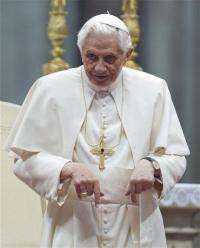Pope calls for responsible, credible climate deal

(AP) -- Pope Benedict XVI called Sunday for delegates attending this week's U.N. climate change conference in South Africa to craft a responsible and credible deal to cut greenhouse gases that takes into account the needs of the poor.
Some 25,000 government officials, lobbyists and scientists are expected to attend the two-week conference that opens Monday in Durban. The immediate focus is the pending expiration of the Kyoto Protocol, the 1997 agreement requiring 37 industrialized countries to slash carbon emissions to 5 percent below 1990 levels by 2012.
Western governments are expected to try to get China and other growing economies to accept legally binding curbs on greenhouse gases, as well. Poor countries want the signatories to accept further reductions in a second commitment period up to at least 2017.
Benedict, who has been dubbed the "green pope" for his environmental concerns, launched an appeal Sunday to government representatives attending the Durban conference to craft a responsible revised Kyoto deal.
"I hope that all members of the international community agree on a responsible and credible response to this worrisome and complex phenomenon, taking into account the needs of the poorest and future generations," he said during his traditional Sunday blessing from his studio overlooking St. Peter's Square.
Benedict denounced the failure of world leaders to agree to a successor treaty to Kyoto during a 2009 U.N. climate summit in Copenhagen. He said then that world peace depends on safeguarding God's creation.
The 84-year-old German pope has voiced increasing concern about protecting the environment in his encyclicals, during foreign trips, speeches to diplomats and in his annual peace message. Under Benedict's watch, the Vatican has installed photovoltaic cells on its main auditorium to convert sunlight into electricity and has joined a reforestation project aimed at offsetting its CO2 emissions.
For the pontiff, it's a moral issue: Church teaching holds that man must respect creation because it's destined for the benefit of humanity's future. He has argued that climate change and natural catastrophes threaten people's rights to life, food, health and ultimately peace.
©2011 The Associated Press. All rights reserved. This material may not be published, broadcast, rewritten or redistributed.


















